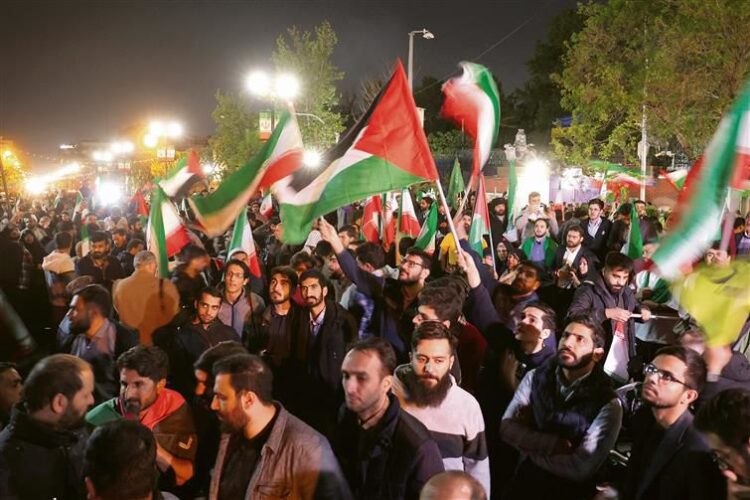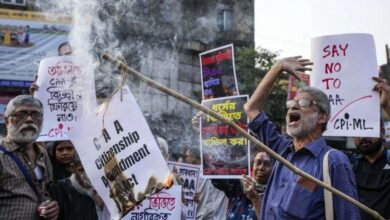In West Asia, shadowboxing
Now in its seventh month, Israel’s assault on Gaza has always held the possibility of escalating into a larger regional conflict. Ultimately, the façade of shadow-boxing between Iran and its allies and proxies on the one hand, and Israel on the other, could only be stretched so far before it broke.

This break occurred on the evening of April 13, when Iran attacked Israel with a barrage of kamikaze missiles and drones. This was the first time Iran has really launched an attack aimed at Israeli land after four and a half decades of vehement rhetoric against its “Zionist enemy.” Some experts thought there had been a violation of an unchangeable red line.
The game was up, and Israel would unavoidably bring the area closer to the brink of catastrophe with a deadly retaliation attack. But is that truly the story, or are we just seeing a fresh chapter in this long-running drama about shadowboxing?
Iran’s vocal support for the Palestinian cause is typically laced with rhetoric of fire and brimstone, which obscures an underlying reality that is now readily visible. In reality, the Islamic Republic’s administration, led by Ayatollah Ali Khamenei, is much more risk-averse and cautious, and it hasn’t shown any desire for direct conflict. Its preferred strategy for deterrence involves using proxies to use its sophisticated capabilities in asymmetric warfare and warn hostile powers while maintaining a plausible deniability of its own operations. As the ancient song puts it, “samajhne waale samajh gaye hain” is the guiding idea.
Although there was no concrete evidence connecting Tehran or its Quds force to the strikes, there was widespread suspicion that Iran had a role in the Hamas attack on October 7. There was legitimate fear, when Israel launched its devastating attack against Gaza, that Iran might release the hardened cadres of Hezbollah to strike Israeli assets from Lebanon, perhaps creating a second front to back its Hamas partners in Gaza. But after six months, it is evident that Hezbollah and Iran have both stuck to the unspoken red lines that have maintained the unstable balance on Israel’s northern border with Lebanon.
Although military and civilian targets a few miles south are well within Hezbollah’s missile range, Hezbollah’s precise bombs have mostly been directed toward the now-empty communities and settlements in northern Israel. In response, Israel has threatened Lebanon severely if Hezbollah intensifies the fight. It has not launched a frontal assault on Hezbollah so far, but it has conducted targeted attacks targeting senior Hezbollah members and assets in Lebanon and Syria.
The Houthis, a Yemeni proxy that Iran has painstakingly cultivated over the years, have unleashed their drones and missiles to disrupt commercial ships in the Red Sea’s maritime arteries. Iran’s methods, training, and stockpiles are all well known; the only surprise is that, if the West keeps up its hostile stance, Iran will be able to discreetly establish its influence and operate as a disruptor.
But on April 1, an Israeli attack on the Iranian embassy’s consular facility in Damascus killed Hassan Mahdavi, the commander of the Quds Force of the Islamic Revolutionary Guard Corps in Syria and Lebanon, upending that precarious balance. Six of Mahdavi’s countrymen were also killed in the accurate hit, which incited a riot in Tehran. Sayyed Razi Mousavi, Iran’s top commander in Syria, was assassinated by Israel in December 2023, and hardliners in Tehran were putting more and more pressure on the government to follow through on its repeated promises of harsh retaliation.
However, Tehran had been telegraphing the military strike that would finally come on April 13 for about two weeks. It did arrive shortly after the conclusion of the Eid-ul-Fitr celebrations, as was widely anticipated. Additionally, Iran has acknowledged that it provided the nations in the area with a 72-hour notice, allowing India and other nations to halt flights and warn their nationals.
It should come as no surprise that “99 percent” of the drones and missiles were successfully intercepted by the US, the UK, France, and even Jordan, in addition to Israel’s powerful Iron Dome and other air defense systems. The US Central Command verified in a statement that it had taken down six ballistic missiles and over 80 drones. The ones that made it through damaged one Israeli airfield in the Negev desert, but not much.
As of right now, it doesn’t seem like this strike was a serious test of Israel’s air defenses or a realistic indication of Iran’s offensive capabilities.
The timing couldn’t have been more ideal for Israel’s beleaguered Prime Minister Netanyahu. Allies like the US, the UK, and France were becoming more critical of the wanton damage and humanitarian misery occurring in Gaza up until this weekend. However, the US government reaffirmed its “ironclad support” for Israel only hours after Iran launched its assault, while the UK and France used their naval forces to block the oncoming rockets.
The Israel Defense Forces’ ability to neutralize the vast majority of the drones and missiles restored its once-tarnished image of invincibility, which had suffered a blow on October 7. For the time being, the US, India, and other countries predictably advise moderation and warn against the risks of escalation, so Gaza is no longer in the headlines. Yes, Netanyahu is once again in the spotlight.
Iran has said that it is prepared to end the game now that its shadow-boxers have successfully delivered their bogus blow, but it would strike fiercely if Israel did so. The contentious Israeli politics are divided along ideological lines.
The National Security Minister Ben-Gvir has suggested that Israel should “go berserk” in order to establish deterrence, and the Finance Minister Bezalel Smotrich has called for a response that “echoes throughout the Middle East for generations to come.” Right-wing leaders want to teach Iran a lesson for crossing the red line. More centrist leaders, including Defense Minister Yoav Gallant and Benny Gantz, have cautioned against making hasty decisions and urged Netanyahu to listen to Israel’s partners and reestablish the country’s strategic relationship with Iran.
The next two days will be critical as Netanyahu balances internal political pressure from the US to craft a response that may have far-reaching effects.







